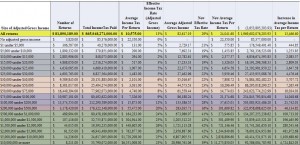 Probably like a great many of you, I am getting sick of hearing about the fiscal cliff, or more accurately, of hearing about the proposed “solutions” to the fiscal cliff.
Probably like a great many of you, I am getting sick of hearing about the fiscal cliff, or more accurately, of hearing about the proposed “solutions” to the fiscal cliff.
It seems that the President and Congressional Democrats, and to some extent Republicans as well, think the only solution is to tax the “rich” and maybe talk about some spending cuts, maybe, some time in the future. I think history has pretty well shown that when the government talks about tax increases and spending cuts the pattern is usually tax cuts now, spending cuts never.
The truth is, the United States government, and many of the states as well, have a spending problem, not a revenue problem. According to the New York Times, the federal deficit for fiscal 2012 was $1,100,000,000,000.00, or put another way, we spent 45% more than we took in. The President’s plan to raise taxes would result in an increase of revenue of about $40,000,000,000.00 in the first year. There has been no solid suggestion on how we would take care of the remaining $1,060,000,000,000.00 beyond a few promises of spending cuts totaling about $100,000,000,000.00. Assuming those actually materialized (which I doubt) we would still have $960,000,000,000.00 to make up to come close to balancing the budget. (There is no way to know if we would see the same amount of revenue in future years as the tax payers changed their finances to minimize the impact. I suspect we would not see even that much of an increase in revenue in future years.)
Some Democrats have admitted that taxing the “rich” is just a start, but that the truth is that everyone will have to pay more in taxes. Howard Dean, former governor of my state has said:
The only problem is — and this is initially going to seem like heresy from a progressive is — the truth is everybody needs to pay more taxes, not just the rich. And it’s a good start. But we’re not going to get out of this deficit problem unless we raise taxes across the board, to go back to what Bill Clinton had and his taxes. And if we don’t do that, the problem is the pressure is going to be on spending even more.
Presumably the pressure he is speaking of is pressure to cut spending. Heaven forbid.
Income Tax information from http://www.irs.gov/file_source/pub/irs-soi/09in11si.xls
My apologies for the readability of the spreadsheet. You can find a copy of it here.
So just how much are we talking about having to raise taxes to balance the budget if real spending cuts are not being considered? There are certainly a number of ways to approach it, but for simplicity I will only share a spreadsheet of one possibility, though I will mention a couple others in the text.
In the spreadsheet above, the first 5 columns are taken directly from the IRS publication linked in the caption. I’ve added colored bands to the adjusted gross income levels to more or less correspond to the 6 tax brackets in the current system. The effective tax rate is the average of the adjusted gross income paid as taxes, not the actual official tax rate. There is a roughly 10-15% difference between the official tax rate and the effective, likely due to deductions and the progressive nature of the system (i.e. the income that falls in lower brackets are taxed lower even if your total income is higher.)
The remaining columns are calculated using the IRS information with the effective rate modified so that the total income taxes paid will offset the current deficit. The total projected taxes collected is shown in the second column from the right in the yellow highlighted row.
In this particular solution, everyone’s effective tax rate on their adjusted gross income is increased by 16.3% and we end up with a small surplus of about $3 billion. The final column in the spreadsheet shows how much the average return for any given income level would go up. I can pretty safely assume that no politician would ever actually suggest this solution given the pretty dramatic increases in taxes for everyone, especially those with lower incomes. For example, people in my income level, $20,000-$25,000, would see their taxes more than quadruple. If we wanted to actually start paying down the debt, say by about $200 billion a year (it’d only take 80 years to pay it off at that rate), we’d be looking at an increase in the effective tax rate of about 19%, which would increase the tax for my income level by a factor of 5.
Another solution I looked at was making the increase in taxes “progressive”, with the higher increase going to the top bracket and each bracket lower would halve the amount of the increase. In this solution I used we could balance the budget by raising the effective rate on the top bracket by about 46%, 23% on the next, 12% on the middle and so forth. The lowest bracket would only see about a 2% increase. While this would likely be a bit more attractive politically as it affects the “rich” more, people in my income level would see their taxes go up about 60% and those filing returns showing around $50,000 would see their taxes about double. So again, this is likely not something any politician would dare suggest.
The final solution I looked at was what tax increase would be necessary if only the “rich” were to see their taxes go up to balance the budget. If we define “rich” as the president does as only those making more than $200,000 per year, then we would have to raise their effective rate by about 57%, making their effective rate about 80%. Remember as noted above the official tax rate runs about 10-15% higher than the effective, so we’d be looking at an official tax rate for the highest earners of 90-95%. While to some this might appear to be acceptable, I think most economists would agree that actually taking 80% of the income of the top producers in the country would have some pretty serious negative effects on the economy.
In fact, all the solutions I mentioned here would have a pretty extreme negative effect on the economy. The Tax Foundation ran a simulation using President Obama’s proposal and found that there would be negative effects in all parts of the economy from GDP, hours worked, pay rate, capital stock and etc. This was at the relatively modest proposal of just raising the official tax rate 3 to 5% on the top two tax brackets and increasing capital gains taxes. I cannot even imagine what effect a tax increase of 10 times the size would do.
Raising taxes is not a viable solution for our financial situation, especially not if the focus is “making the rich pay a little more.” But as then Senator Obama said in 2007, raising taxes on the “rich” is not about revenue, but about “fairness.” Until those in government actually agree to take serious action to cut spending, there is no real solution to the financial problems of this country.
Notes: There is a likely a fair amount of error in the estimates I made above. This is because the latest data I could find regarding income tax broken down by income bracket is from 2009, information about the sources of federal revenue is from 2011 and the budget deficit is from 2012. When taken together, I don’t believe this changes the overall picture, though the details would obviously be different.
Add in to that that I am looking only at increasing personal income taxes and not other forms of taxation. However, since in 2011 income taxes and social security taxes (which to my mind are essentially the same) accounted for 47.4% and 35.6% respectively of federal revenue, I don’t believe this changes the overall result either.
Still further, given my understanding and the data available, I wasn’t able to accurately reflect the progressive nature of the taxes. Meaning, even the “rich” paid a lower rate for their income that falls in the lower brackets. I believe that this is part of the reason for the difference between the effective tax rate and the official one, along with deductions. For the first to solutions, I don’t think this is a huge issue, but it almost certainly is for the last. The effect of this would likely be the need for an even higher increase or applying that increase to lower income levels, which just makes the solutions even less palatable.
Lastly, I have no way of knowing if it is even possible to actually collect such increases in effective tax rates as mentioned above. There would be huge incentives, especially among the higher earners, to adjust their finances to minimize the impact. Even those at more modest income levels might find incentives to work less, especially if they are on the bubble between tax brackets.
Regards.
Sources
http://www.irs.gov/file_source/pub/irs-soi/09in11si.xls
http://www.realclearpolitics.com/video/2012/12/06/howard_dean_the_truth_is_everybody_needs_to_pay_more_taxes_not_just_the_rich.html
http://www.heritage.org/federalbudget/federal-revenue-sources
http://townhall.com/tipsheet/katiepavlich/2011/07/15/flashback_obama_says_raising_taxes_not_about_revenue_but_about_fairness
http://taxfoundation.org/article/simulating-economic-effects-obamas-tax-plan


Math is hard. It’s much, much easier to rely on the government’s (Dem & Rep) promise that it’ll all work out, that deficit and debt levels will always be “manageable”, and there will always be enough money for government to spread around to everyone. Don’t worry, be happy!
Nevermind the man behind the curtain. OZ the wise and powerful has everything under control. You’ll be well taken care of. For awhile.